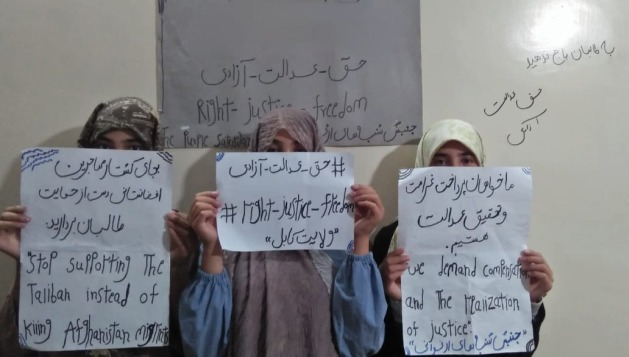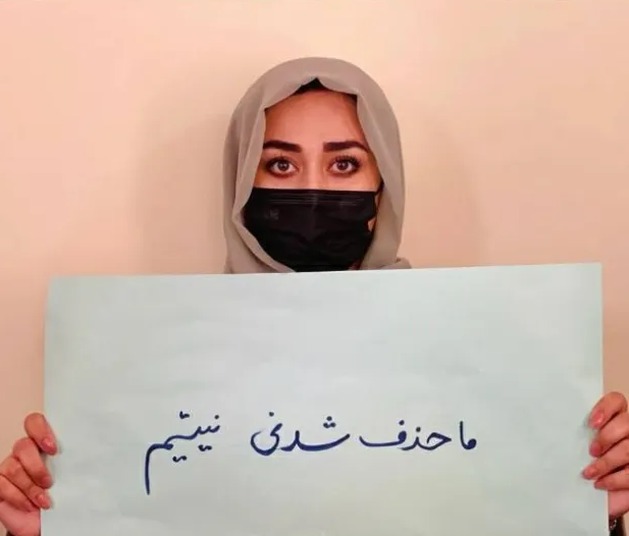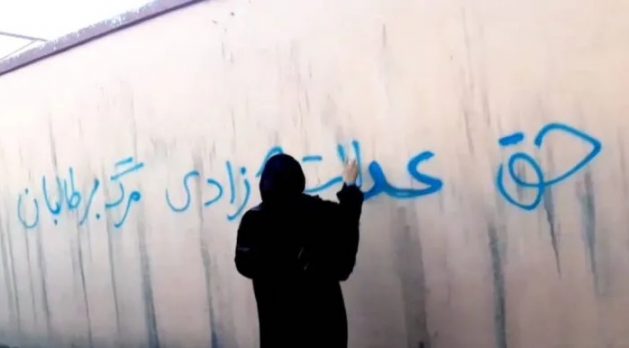KABUL, Apr 25 (IPS) – The author is an Afghanistan-based female journalist, trained with Finnish support before the Taliban take-over. Her identity is withheld for security reasons“Even if our murals don’t change much, they will surely leave a mark – at least on the mind of one Taliban member who sees them.” These words from Afghan women activists reflect the bold and creative tactics they continue to use in their resistance against the Taliban’s oppressive regime.
In guerrilla-style operations, a group of young women choose a location together, spending hours surveilling it to ensure Taliban forces are not nearby. Once the location is deemed safe, they write their messages on the walls and immediately disperse in different directions, sometimes avoiding their homes for several hours to throw off any possible surveillance that might have been trailing them.
“Three core principles serve as the motivation in our remobilization, to rid us of tyranny”, declares the Purple Saturdays Movement, name of the group waging the secret campaign. They are encapsulated in a three-word slogan: Right, Justice and Freedom.
Undeterred by the risk of brutal torture or arrest, the movement continues its protests inside Afghanistan in confined places and in different forms.
“Women in Afghanistan have organized widespread protests and activities against the Taliban’s policies over the past three years,”, says Maryam Marouf Arwin, head of the Purple Saturdays Movement. “Their efforts have had a significant impact globally and regionally, preventing many countries from recognizing the Taliban’s self-proclaimed government.”

Established on August 17, 2021, exactly two days after the Taliban took control of the country, Arwin says the Purple Saturday Movement, is the beginning of a new leap of hope at the height of despair. It has raised its voice against all Taliban orders and has held its protests, both on the streets and behind closed doors.
The movement is guided by the conviction that all Afghan people have been victims of the Taliban’s brutal regime. Therefore, their central goal is to achieve equal rights, justice and freedom for all Afghan citizens irrespective of gender, religious convictions and ethnic background.
In their latest street protests, the movement has demanded strong resistance against Taliban policies, and called for approval of the arrest warrant for the leader of the Taliban, Hibatullah Akhundzada and Abdul Hakim Haqqani, the head of the Taliban’s Supreme Court issued by the International Criminal Court.
Previously they have organized both individual and group protests in public and behind closed doors, speaking out against the Taliban’s decision to shut down educational institutions and all other repressive policies the brutal Islamist regime has targeted on women.
“We are committed to continue our struggle despite the Taliban’s brutal repression,” the group defiantly declares, “our goal is to end the Taliban’s rule and ensure social justice in the country”.
The movement contends that Sharia law is an excuse to eliminate women, and that the Taliban regressive rule is implemented under the guise of religion to oppress the people of Afghanistan. Nevertheless, they maintain that events in the past three years have proved that women of Afghanistan will not surrender and be isolated.
The Purple Saturdays Movement asserts that, “Considering the actions of the Taliban against the people of Afghanistan, particularly women, vulnerable ethnic groups, and religious minorities over the past 20 years, especially their conduct in the last three years, it is evident that the Taliban are neither susceptible to change nor flexibility.”
As outlined by Arwin, the movement’s activities include street protests, individual and collective demonstrations in confined spaces, wall inscriptions, social media hashtags, crafting declarations and resolutions, publishing reports, writing articles, and making appearances across various media.
She however, states that, “the standard for protests is not designated to take place only on the street. Protests have taken place in many countries for years, she points out, but they weren’t always on the roads, but nevertheless, the world has seen and welcomed such protests and recognized them. However, according to her, the protests of Afghan women have gone unnoticed whether held on the streets, in closed spaces, or on social media.”
The Taliban’s repression has become truly horrific. Recent reports make every family cringe when their daughter goes out to protest. Faced with arrest, rape, and sexual harassment by the Taliban, no one dares to let their daughters onto the streets. “For the safety of our members, we are forced to hold individual protests in closed settings and on social media,” Arwin says.

In that regard, she is appealing for political and diplomatic support from governments of the European Union and the United Nations, to take a clear and decisive stance against crimes against humanity and oppression of Afghan women.
“We ask you to make our voices heard widely in the media and international forums.”
With the Taliban regaining control, the people of Afghanistan, especially women, religious minorities, and vulnerable ethnic groups, have once again returned to the dark and oppressive days in the past when Taliban made their first appearance as rulers in the country.
In the very first days of regaining control of Kabul in August 2021, the Taliban declared war on the women of the country. Since then they have issued dozens of decrees and orders, which have eviscerated all fundamental human rights from women throughout the country.
“From the first moment of oppression, our movement has fought against the darkness and will continue to fight until we achieve freedom,” Arwin concludes.
© Inter Press Service (2025) — All Rights Reserved.




